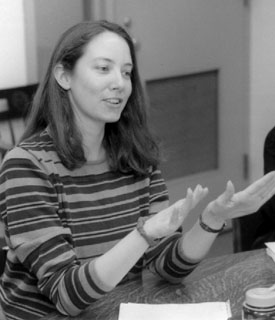Unlocking the Internet’s Library

Here is a computer, and here is an assignment: log on and find out something interesting about Australia. Do you search using the key word “Australia”? Or do you search using “Australia+money+food+school+sports+cooking+climate”?
Is there a right way to search?
Kathleen Guinee, a second-year doctoral student at HGSE, doesn’t believe there is a right way; however, some ways seem to be more successful than others.
As part of her research on how middle- and high-school students navigate the Web, Guinee observed one 16-year-old student who tried all of the above search terms. He found too many web sites, none of which served his purposes.
“It’s incredibly easy to get lost in the Internet,” says Guinee. “If you’re not extremely focused, you might start out looking for Australia and end up looking at baseball cards.”
Long after HGSE professor Howard Gardner’s theory of multiple intelligences has gained mainstream recognition, our most abundant information resource, the Internet, is still a locked library for students who don’t organize knowledge in a linear fashion. If prevailing browsers favor certain intellects in the same way that IQ tests do, the World Wide Web may be leaving the majority of students behind.
That’s why, last summer, Guinee began research at a computer camp hosted by the Center for Applied Special Technology (CAST), a Peabody-based not-for-profit organization directed by HGSE lecturer David Rose that researches how technology can remove barriers to learning. With CAST, Guinee is working to develop a computer-based tool that will make searching the Web easier for all students.
Developing such a tool requires an understanding of students’ search strategies on the Web. Guinee gave 16 campers an assignment to gather information about islands of their choosing. The more successful searchers started with broad terms that they refined. So, “Hawaii” became “Hawaiian dance,” which became “Hawaiian hula dancing,” and so on. This approach is called “hierarchical searching.”
Many of the campers used another technique altogether. They searched categorically. One 11-year-old wanted to learn about birds in the Bahamas. She searched for broad subject headings, such as “birds” or “Bahamas” occasionally combining categories to create more narrow terms.
“Categorical searching” wasn’t as effective, which may present a real problem for these students. While the “digital divide” makes computer technology an elite domain, a “cognitive divide” may hinder some students’ school performances and, eventually, their professional success.
A hierarchical thinker herself, Guinee excelled in school and wondered why others had difficulty. “Some people may view a mountain as a challenge, then draw satisfaction from climbing it,” she says. “For me, knowledge is that mountain.” After four years as a computer consultant, Guinee came to the Ed School to help those for whom learning hasn’t had such appeal. “If people aren’t learning, I believe it’s because they’re not being taught in a way that works for them. Learning should never be insurmountable.”




